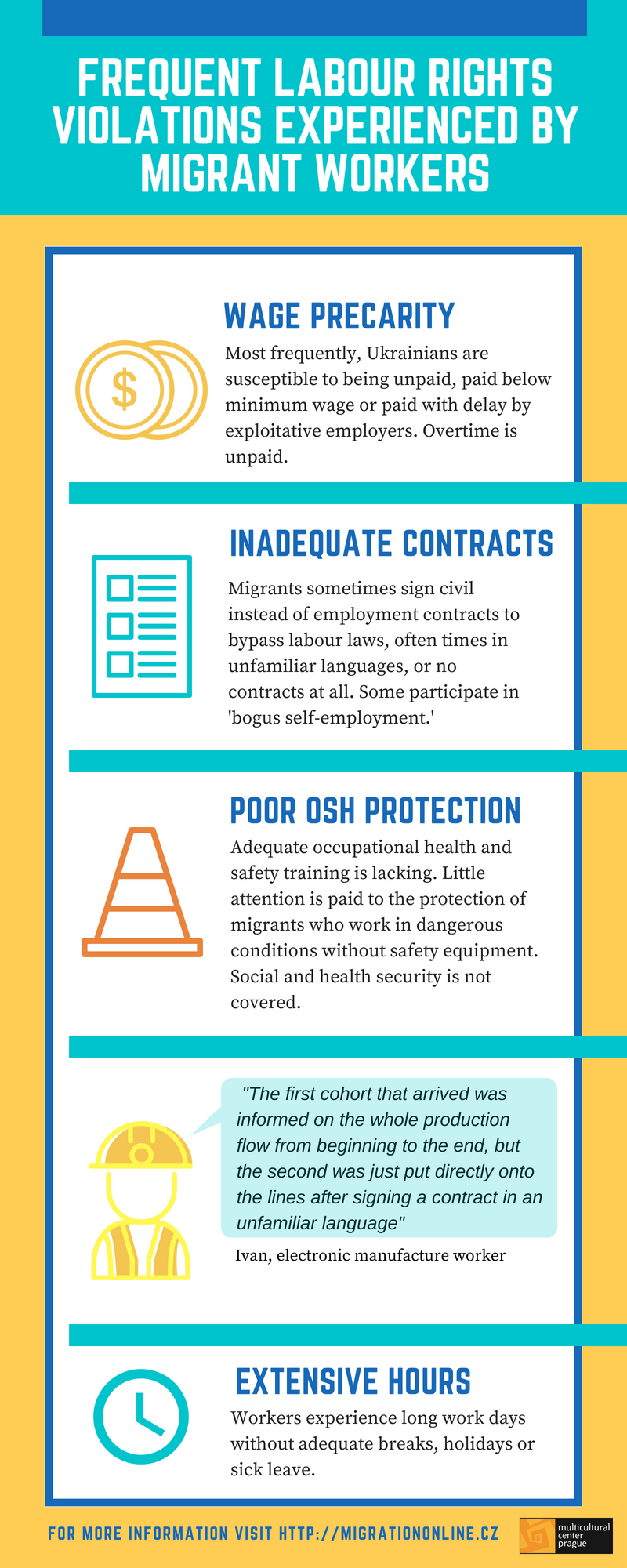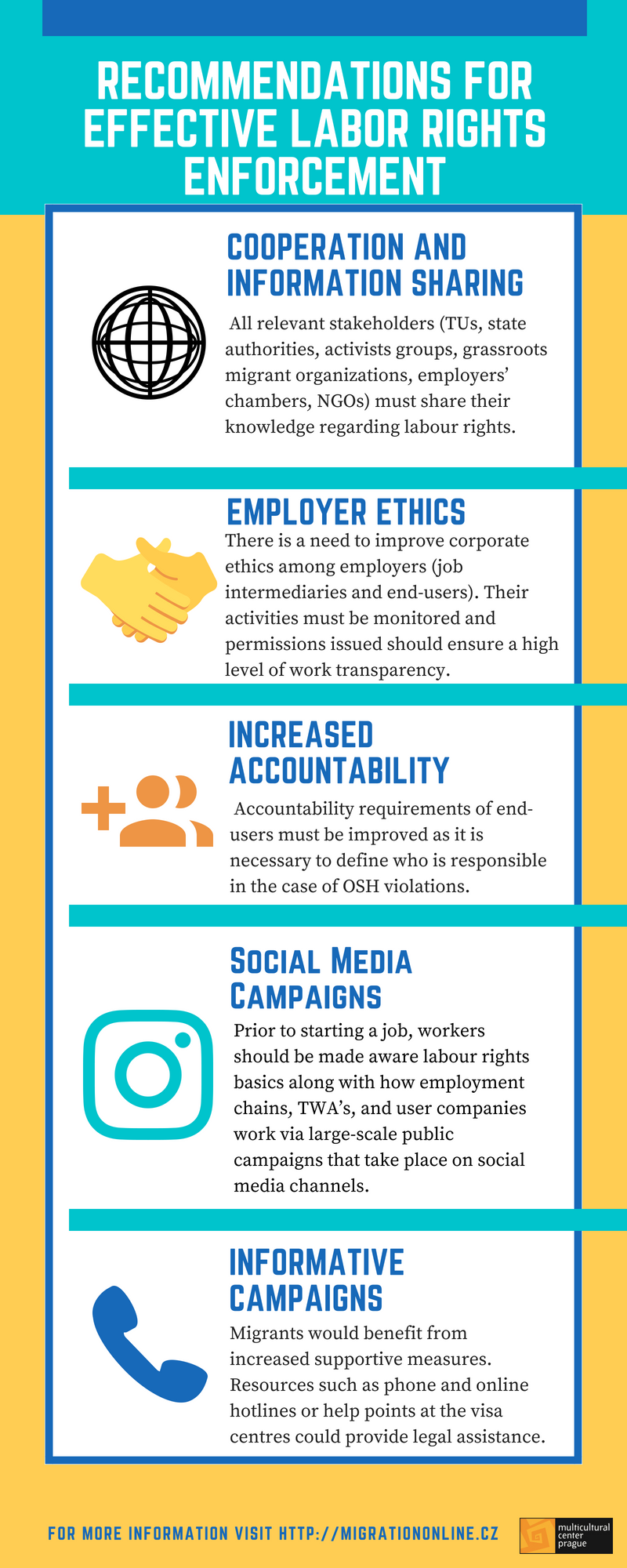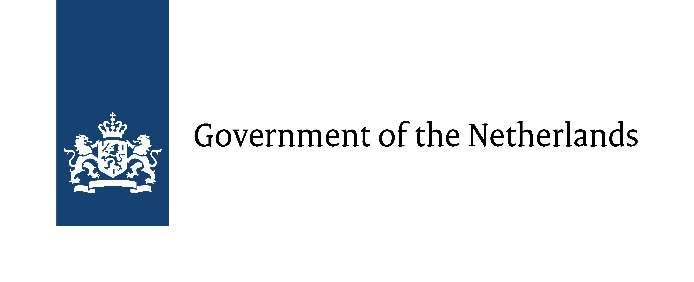Press release: Country studies reveal common labour rights violations and possibilities of enforcing migrant workers’ rights in the Visegrad countries.

New research focusing on the patterns of wide-spread Ukrainian labour migration to Visegard Group (V4) countries unveils a common trend of unfavourable working conditions for migrant workers. Labour rights violations, precarious employment and substandard working conditions amongst temporary and low-skilled Ukranian workers are of no exception in Hungary, Slovakia, Poland and Czech Republic despite heterogeneous migration patterns between the countries.
Key findings
The project “Towards stronger transnational labour enforcement cooperation on labour migration” is based on qualitative research conducted in the V4 countries and Ukraine on emerging trends and employment patterns among Ukrainians working in low-skilled professions, the results of which you can find on our website. General trends present include low job security, an ongoing erosion in the quality of employment forms and high employer dependency. Another issue is a lack of support networks for undocumented migrants. Without proper resources, they could face fines, deportation and a ban on entry. A vast majority of the interviewees have found employment in informal labour-intensive sectors such as hospitality, tourism, construction, and manufacturing through intermediaries. Confirmed by all five studies, the latter market has recently flourished in the region partly due to restrictive migration policies.
Cases of violations of the labour rights of Ukrainian migrant workers bear striking resemblance in all employment sectors studied. Ukrainians frequently face violations connected to their wages - being unpaid, paid below minimum wage or paid with delay. Other violations include the absence of labour contracts or the provision of such in an unfamiliar language.
“I signed it without reading or knowing what was in it. I am young. I was in a hurry. Let’s say I trusted them. Later on, they brought us a translation in Ukrainian, already here at the plant, when we were already working. That happened in a month or two. We then signed then new contracts in Ukrainian”
says a respondent employed in Hungary. In some cases, inadequate labour contracts are translated into the workers native language and then signed. Workers are dependent on exploitative employers. An employer might require a trade licence instead of proper documentation to deprive workers of social services. Very pressing is the issue of safety at the workplace, since workers are not given the mandatory OSHA training and appropriate safety measures are not secured.
“We had neither protective gear including a mask, nor helmets, only gloves were available.”,
admits Pavel, a construction worker from Ukraine . Apart from these above mentioned violations, a lack of paid overtime, social security and breaks are often encountered by the workers.

The phenomenon specific for the Czech Republic is the usage of the mechanism of posting workers whereas it is rather marginal for other V4 labour markets. This means that the Ukrainian labourers work illegally and their fragile position is being exploited by the employers. Workers with Polish visas are thus reluctant to get help in the unfavourable situations they face.
“You are afraid to contact someone because you have a Polish visa. And those people [Czech employers] are simply abusing this…”
says Vasyl who works on construction in the Czech Republic.
Possible remedies
Despite divergences in legislative framework and institutional setting concerning labour migration in V4 countries, similar actions are needed for effective labour rights enforcement. The remedies should arise from all stakeholders involved in the issue - the state and its institutions, employers, other social partners and workers themselves. States should consider simplifying the bureaucratic procedures connected to the issuing of work and residence permits to foreigners. Such bureaucratization limits the mobility of the labour force on the labour market, which brings losses to the economy.
Employers must improve corporate ethics as they bear significant responsibility for the workers they hire (CSR ideas). Since intermediaries have become the main employer of migrants and provider of labour force, there is a need to continue thorough monitoring of their practices, increase the accountability requirements of end-users and private entities involved in the labour migration process from Ukraine.

There is an urgent need to improve accommodation of the workers. In particular, it should not reinforce the exclusion and ghettoisation. All actors should cooperate in this matter (municipalities, employers, trade unions, NGOs).
Special attention should be paid to workers themselves by raising awareness through informative campaigns in all countries involved. Creation of help points at visa centres or consulates, phone or online hotlines could make the information about labour rights more accessible.
In the case of Ukraine, a thorough transformation of the principles, practices and institutions related to labour protection is needed to bring Ukraine "out of the shadow.". Various social actors should be involved in wide public discussion of the reforms (trade unions, NGOs).
This publication has been produced as part of project “Towards stronger transnational labour inspection cooperation” (STRONGLAB), funded by the International Visegrad Fund and the Ministry of Foreign Affairs of the Kingdom of the Netherlands
Responsibility of ideas or opinions expressed in this publication lies with the authors of the project. Neither the International Visegrad Fund nor the Ministry of Foreign Affairs of the Kingdom of the Netherlands are responsible for those ideas or opinions nor for any use that may be made of them.

